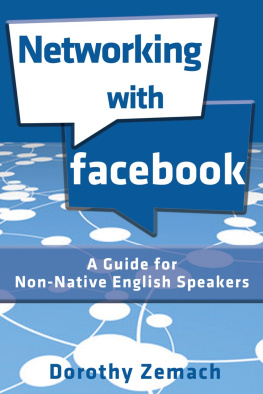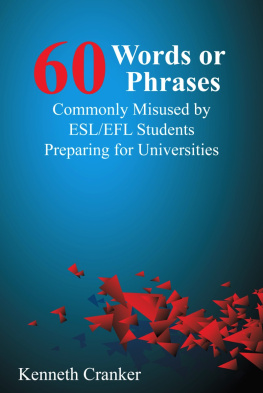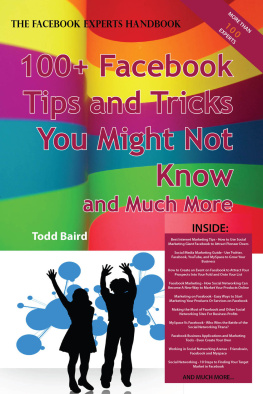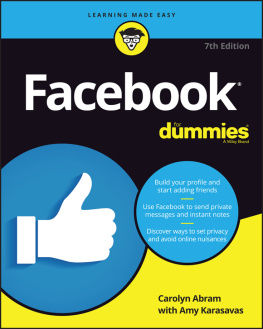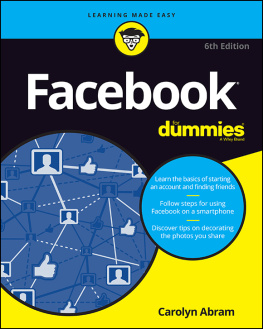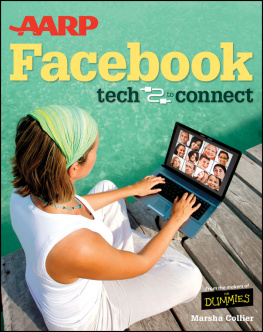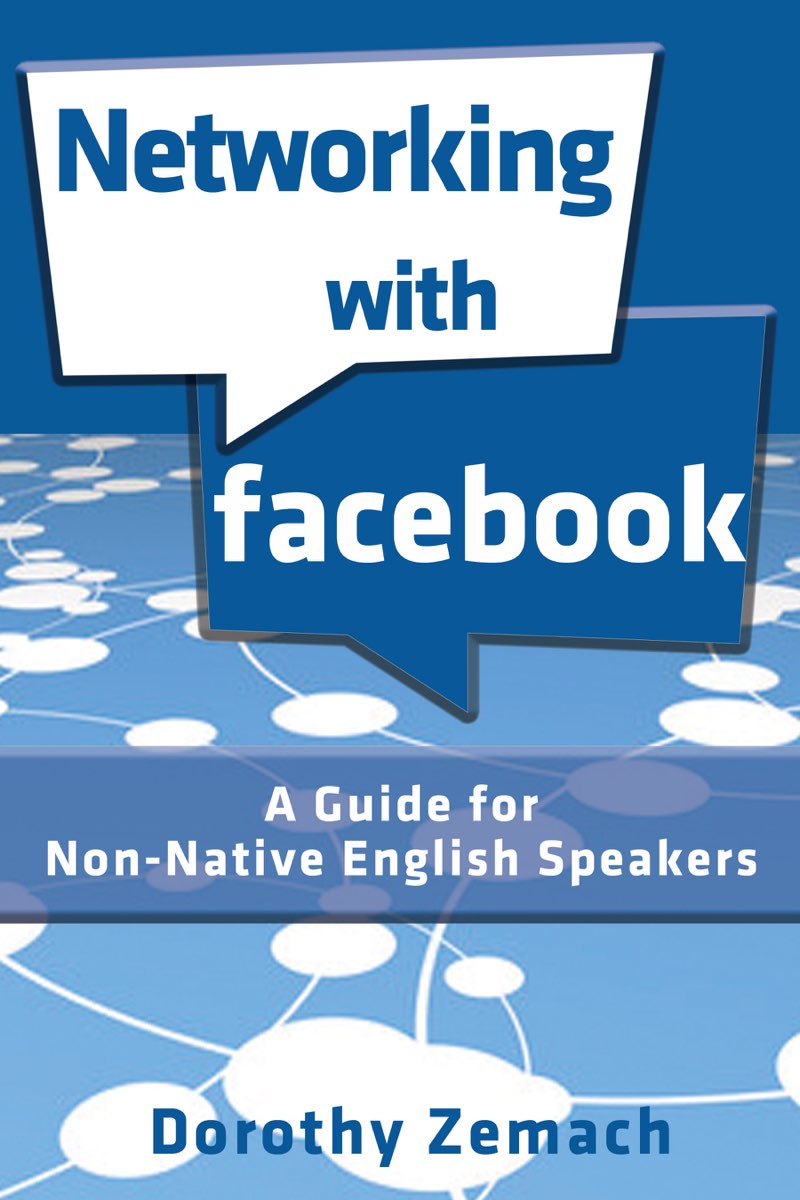Networking with Facebook
A Guide for Non-Native English Speakers
Dorothy Zemach
Copyright 2018 by Dorothy Zemach
Cover design by DJ Rogers
Illustration by Will Mitchell
Edited by Jonathan Caws-Elwitt
All rights reserved.
No part of this book may be reproduced in any form or by any electronic or mechanical means, including information storage and retrieval systems, without written permission from the author, except for the use of brief quotations in a book review.
Contents
Introduction: Using Facebook in English
As of 2018, Facebook had 2.23 billion active users every month. Thats more people than live in any country on earth! Facebook is available in 101 languages, everything from Arabic to Zulu, including Corsican and Maltese.
However, the most common language on Facebook is English. If you have a friend who lives in Corsica, youll probably communicate on Facebook in English, rather than Corsican. Your friend, of course, will communicate in English with some people and in Corsican with others.
So what language should you use on Facebook?
There is no one answer for everybody. Naturally, you will use your native language, and connect with others who speak that language. But what you want to connect to someone who doesnt speak your languagethat friend in Corsica, for instanceyou might want a bilingual Facebook presence, in both your language and English.
You could post a status update first in your native language and then in Englishthat way, everybody (or almost everybody!) would be able to read it. Or you might post about some topics in one language, and other topics in a different language.
However, if you never post anything in English, dont be surprised if people who only speak English dont accept your friend requests. It doesnt mean they dont like you! It just means that they cant read anything on your page, so there doesnt seem to be a good reason to connect.
You already know that different countries, and indeed different languages, have different cultures and customs. Its the same on Facebook. There is a certain culture of communicating on social media platforms in English. The purpose of this book is to help you use Facebook successfully in English, to fulfill your goals and form strong and positive relationships with other people.
People, in any language, have different personalities. It is not possible to describe only one way to communicate or to use a platform such as Facebook. There will always be exceptions. The goal of this book is to help you get along with most people in most situations, when you are using Facebook in English. But you will, of course, have to use your own common sense, good judgment, and kind heart to communicate successfully with others.
A note on language: English, like all languages, is constantly changing. I believe in a decade or so, the pronouns they and their will be commonly accepted in a singular sense, even in written language (as they now are in spoken language). This book, then, uses they to refer to one person, who could be any gender.
Lets get ready by looking at your existing Facebook account and making some plans. First, here are some questions to ask yourself:
What is my goal?
What do you want from Facebook? Even if you think this is a very basic question, take the time to answer it. Write your answer down, even. (That will force you to put it into words). For example,
- Do you want to reconnect with friends youve lost touch with?
- Do you want to share ideas and discuss issues with other people who do the same sort of work you do, or who have the same hobby?
- Are you looking for work or opportunities to study or travel?
- Do you want to publicize events or programs youre involved with?
Who would I like to connect to?
I dont mean specific people; I mean, what kind of person?
- Someone who has the same job? Someone who lives in the same community?
- Someone who lives in a country that interests?
- Someone who likes the same music or games?
What does my Facebook page look like now?
Log out of Facebook, and then visit your page as if you were someone else. What impression do you think a stranger would get? (Can they get an impression at all, or is your account very private?) Do you think your page is meeting your goals? Why or why not?
Now, log back in and check a few things.
- Are you happy with your profile photois it clear and current? Is your cover photo attractive? Does it show something meaningful to you? (Note that some people do not like to accept friend requests from strangers if their profile photo is not of their face.)
- Go back through all the photos that you have posted, and that other people have posted and tagged you in. Do you want them to be visible to the world? Are there any youd like to delete?
- Check the pages you have liked. Are you still interested in those things? (Rememberother people can see everything you have liked.) If there are any youre no longer interested in, remove the like.
- Check the groups you have joined. Are you still interested in all of them? (As with page likes, other people can also see which groups you belong to, if theyre public.) Leave any groups that no longer meet your needs and goals. If there are groups you still want to belong to, but right now, you dont want to see all the posts in them, visit the group and turn off notifications. You can still remain a member.
- Check your friends list. You can unfriend anyone you dont wish to be connected to at all, of course. You can also unfollow someone (permanently, or just for a little while) if you want to remain friends, but not see their posts. If you unfollow someone, they can still see what you post. People considering your friend request might check to see who your current friends are.
- Finally, check your privacy settings. How much do you want to show the world? If you make everything private, then other people will not be as likely to accept your friend requests (because they wont be able to see anything about you and your behavior). If you give too much information, you could be at risk for things like identity theft. For example, I have my birth month and day posted, because I enjoy having friends wish me happy birthday. But I dont have the correct year of my birththat gives too much information to identity thieves, and my friends arent interested in it anyway.
A note about privacy: You should be aware that many of your actions on Facebook intrude on your privacy in some way. Every time you click on an advertisement or follow a link or play a game or answer a fun survey, you are giving away information about yourself. That isnt necessarily dangerous or bad, but it does make you more vulnerable. In any case, you should be aware that it is happening, and make a deliberate choice to participate (or not!).
Its a good idea to not post words or images on Facebook (or any website) that would damage you if they became public. Facebook does have some privacy controls, but as we know from reading the news, privacy controls can fail, and hackers can be very clever. Protect yourself by simply not putting very sensitive information onlineever.

